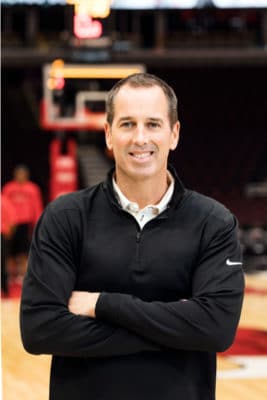
Michael Jordan missed the game-winning shot twenty-six times. J.J. Watt was once a walk-on at the University of Wisconsin–Madison. Serena Williams was on the wrong side of the biggest upset in the history of women’s tennis after losing to number forty-three-ranked Roberta Vinci in the 2015 US Open semifinals. And Matt Ryan walked out of NRG Stadium in defeat after walking on that same field at the end of half-time with a twenty-five-point lead in Super Bowl LI.
These are just a few of the times when the most renowned athletes in the world are at their most vulnerable. Nothing makes an athlete more humble than defeat, which makes victory itself all the more rewarding and authentic to their adoring fans. It’s this same determination, authenticity, and mind-set of an athlete that Jeff Kearney and his team at Gatorade bring to help fuel competitors through victory and defeat, on and off the field of play.
“Whether you’re a tennis player like Serena, a football player like J.J., or a basketball player like Michael, you’ve probably had a moment where you had something happen that drove you to succeed and pushed you to never let that happen again,” says Kearney, global head of sports marketing for Gatorade. “We take a lot of pride in identifying those stories that can speak to all athletes.”
Kearney is a self-described gym rat and someone who loves the athletic experience. After enjoying tenures at the Big Ten Conference and Conference USA, Kearney joined Gatorade in 2004. Now managing Gatorade’s global roster of sports partnerships, as well as overseeing partner services and inclusive educational platforms, Kearney relates his role to the same mentality of those in professional sports.
He works with his team the same way a coach would. In fact, the roster at Gatorade is as impressive as a championship-caliber squad. There are credentialed sports medicine professionals, certified athletic trainers, dietitians, a master strength and conditioning coach, scientists, sports medicine professionals, and some of the best-in-class marketers.
“I make sure that we’re setting ourselves up for success, we’re drawing up the right game plans, and if we need to call a timeout, both myself and that individual have the ability to do it,” Kearney says.
Gatorade has an unrivaled recognition in the world of sports fuel and athletic equipment. For that reason, having such a strong team contributes to one of the company’s greatest assets: authenticity. Gatorade was developed in the mid-1960s by several researchers at the University of Florida in response to football players being affected by heat and heat-related illnesses as a result of fluids and electrolytes lost through sweat. The drink was developed to replenish those key components.
By the end of the 1980s, Gatorade became the sports drink of choice on NFL sidelines. And in 1991, Michael Jordan introduced Gatorade to a new generation of athletes with his iconic “Be Like Mike” commercial.
“When you turn on the TV to watch a sporting event—whether it’s a college football game, a college volleyball game, or a major professional sporting event—you’ll hopefully see us there fueling the best athletes in the world.”
“My team is part of the fabric of sports and sports marketing. We’re the visible conduit between the world of sports and our brand,” Kearney says. “When you turn on the TV to watch a sporting event—whether it’s a college football game, a college volleyball game, or a major professional sporting event—you’ll hopefully see us there fueling the best athletes in the world.”
Kearney explains that authenticity comes from developing and maintaining close relationships with athletes and teams with which the company partners. In order to develop those relationships, Kearney says it’s about listening on and off the field of play, as well as keeping in touch with them about their athletic goals in individual and in team capacities to create an authentic marketing strategy.
“We have a phenomenal consumer engagement team,” Kearney explains. “We can sit down with them and talk about things that we have learned in the locker room about an athlete that they can then translate into great storytelling. That comes across not only as authentic for our brand, but also authentic for that athlete as well because it’s something true to them, something that they live by.”
Gatorade’s organizational culture also fuels that branding and authenticity. At the company’s headquarters in Chicago, Kearney says the team immerses itself into sports, training, and in-season and off-season planning for some of the world’s most well-known teams, players, and competitions. “Everybody does their part. They know that the team works harder than the individual, and we have a lot of success with that,” he says. “We pride ourselves on living the brand.”
Just as athletes display that authenticity through wins and defeat in competition, so too does Gatorade, and Kearney expresses the importance of learning from both wins and losses just as the company’s athletes do.
Michael Jordan went on to win six NBA championships and was named MVP in the finals each of those years. J.J. Watt earned NFL defensive player of the year three times. Serena Williams bounced back to win the Australian Open in 2017, and Matt Ryan finished the 2017 season with one of the highest quarterback ratings in the league. But whether it’s a loss or a win, the passion remains the same, and it’s that same passion Kearney lives by at Gatorade.
“If you get an opportunity to work in an industry that you love, then take it,” Kearney says. “It’s incredibly rewarding and incredibly challenging both personally and professionally. I think Gatorade provides that impact for a lot of people. I’m certainly enjoying the experience. It’s just an honor and privilege to work on this brand.”
Photo: Courtesy of Gatorade
From the Lab to the Field
In the summer of 1965, the assistant coach of the University of Florida’s football team, the Florida Gators, inquired with team physicians about why so many players were being affected with heat-related illness.
Dr. Robert Cade, Dr. Dana Shires, Dr. H. James Free, and Dr. Alejandro de Quesada soon discovered that the athletes were losing fluids and electrolytes through sweat and not getting those essential components replenished. The large amounts of carbohydrates that a player’s body used for energy were also not being replaced.
With this information, researchers took their findings to the lab and formulated a new beverage with carbohydrates and electrolytes to replace those key ingredients lost. They affectionately named it Gatorade, and in the decades to follow, athletes have been using the sports drink to fuel their victories.

